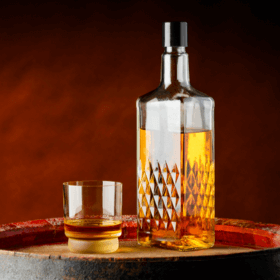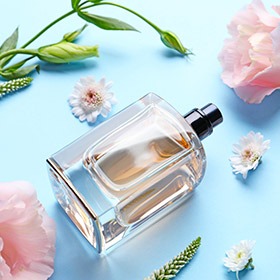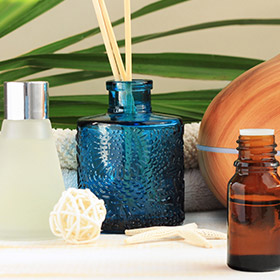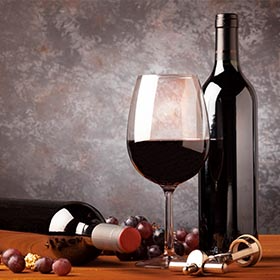Introduction
For any emerging distillery, choosing the right liquor bottle is more than just packaging—it reflects your brand image, product quality, and market positioning. In today’s competitive spirits market, a unique and functional design can help new brands stand out and attract target consumers. With so many bottle shapes, materials, and liquor bottle manufacturers to choose from, startups often feel overwhelmed. Key factors like capacity, shape, neck type, glass material, manufacturing process, sustainability, and customization all require careful consideration.
This guide offers a complete overview of how to select the right liquor bottles, including classifications, materials, production processes, and customization tips. We’ll also explore cost budgeting, environmental impact, and sourcing from trusted suppliers offering 750ml glass liquor bottles wholesale. Finally, we’ll introduce Roetell Glass—a reliable partner with rich experience in the glass packaging industry—to support your journey from startup to success.
Understanding the Basics of Liquor Bottles
Before we delve into how to choose spirits bottles, we first need a comprehensive understanding of their basic composition, classification, and manufacturing processes. This will not only help new distilleries better understand the characteristics and suitability of various bottle types, but also provide them with a professional perspective when communicating with suppliers, ensuring that the final selected bottle perfectly matches their product needs and brand positioning.
Classification and Common Types of Liquor Bottles
There are many ways to classify spirits bottles, which can usually be divided according to capacity, shape and bottleneck type. Each classification corresponds to different market needs, product characteristics and consumer preferences. Understanding these classifications will help new wineries to clarify product positioning and packaging direction during initial planning.
Classification by Capacity (Standard vs. Custom Capacities)
Liquor bottles typically range in size from small sample bottles to large-format displays. The most commonly used sizes include:
50 ml (Miniature/Mini Bottle): Usually used for samples, travel packs or gift sets, convenient for carrying and trying.
200 ml liquor bottle(Pint): Ideal for samples or limited editions.
375 ml (Half-Pint/Demi): Common for smaller spirits and liqueurs.
750ml alcohol bottle(Standard/Fifth): The industry standard for global spirit packaging.
1 liter alcohol bottle(Liter): Preferred for international or value packaging.
1.75L and larger(Magnum/Handle): Often used for commercial sales or group consumption.
Custom capacities can set your brand apart. For instance, launching a premium gin in a 900 ml custom liquor bottle might appeal to niche markets.
Classification by Shape (Round, Square, Irregular, etc.)
The shape of a spirits bottle significantly influences its visual appeal, shelf presence, grip, and overall brand perception. The most common options—round, square, and irregular-shaped bottles—each offer distinct advantages.
Round Bottles
Round bottles are traditional and widely used.
Efficient to produce and compatible with automated filling and labeling.
Cost-effective due to lower mold and maintenance costs.
Durable, distributing internal pressure well—ideal for carbonated or high-proof spirits.
Versatile, suiting nearly all spirit types. However, they offer lower shelf space efficiency and may lack visual uniqueness.
Square Bottles
Increasingly popular among modern and premium brands.
Better space utilization in storage and transport.
Modern and upscale look, ideal for stylish brand positioning.
Flat surfaces make labeling easier and more visible. Drawbacks include higher mold costs and fragility at corners.
Irregular Bottles
Custom, artistic shapes—like heart, animal, or sculpture forms—are used for high-end or limited-edition spirits.
Stand out instantly, strengthening brand recognition and storytelling.
Associated with luxury and exclusivity.
Serve as marketing tools to drive attention and conversation. On the downside, they involve high production costs, complex filling and labeling, and challenging logistics.
Recommendation: For startup distilleries, begin with round or square bottles to optimize costs and production. As the brand matures, invest in custom irregular bottles to enhance identity and market appeal.
Classification by Neck Type (Screw Top, Cork Top, etc.)
The bottleneck type determines the sealing method of a liquor bottle, directly impacting product preservation, flavor retention, and user experience. The most common types include screw tops, cork tops, and other specialty closures.
Screw Top
Widely used in daily-consumption spirits:
Excellent sealing prevents oxidation and preserves flavor.
Easy to open and reseal, enhancing convenience.
Cost-effective and suitable for automated production.
Tamper-evident designs improve safety. However, some premium brands feel screw caps lack traditional appeal.
Cork Top
Preferred for high-end or aged spirits like whiskey and brandy:
Conveys elegance and tradition.
Breathable cork allows limited air exchange, aiding aging.
Enhances the ritual and experience of opening. Downsides include higher cost, risk of TCA contamination, and storage requirements to prevent cork drying.
Other Types
Glass stoppers offer luxury and excellent sealing, but are costly.
Synthetic corks mimic natural corks while avoiding contamination.
Crown caps, though rare, are used for select spirits with a vintage or experimental positioning.
Recommendation:
Startups should align closure type with brand image, budget, and market segment. Use screw caps for mass-market efficiency, and consider corks or glass stoppers for premium positioning.
Materials and Manufacturing Processes of Liquor Bottles
The material selection and manufacturing process of spirits bottles directly determine the physical properties, appearance quality, cost and protection of the contents of the bottle. Glass is the preferred material for spirits bottles. Its unique chemical stability, transparency and plasticity make it an ideal packaging solution.
Advantages and Selection of Glass Materials (Soda-Lime Glass, Borosilicate Glass, etc.)
Soda-Lime Glass
Soda-lime glass, composed primarily of silica (≈70%), sodium oxide (≈15%), and calcium oxide (≈10%), is the most widely used material in commercial liquor packaging—accounting for over 90% of all liquor bottles globally.
Cost-Effective: Its low melting point and easy formability make it ideal for mass production.
Reliable Performance: It offers sufficient mechanical strength and chemical stability to meet the packaging needs of most spirits.
Wide Application: Commonly used in 750ml glass liquor bottles wholesale, and packaging for various spirits, wines, beers, and beverages. For most new distilleries, soda-lime glass is a practical and economical choice that balances durability with production efficiency.
Borosilicate Glass
Made with a higher content of boron trioxide and silica (e.g., Pyrex), borosilicate glass is engineered for superior performance in demanding environments.
High Thermal Shock Resistance: It withstands sudden temperature changes, making it suitable for hot filling processes.
Enhanced Chemical Stability: Offers better resistance to acids and alkalis, ideal for spirits requiring long-term or extreme storage conditions.
Lightweight & Clearer Appearance: Slightly lower density and higher clarity provide premium visual appeal and weight advantages.
Limited Use: Due to its higher cost, borosilicate glass is mostly reserved for high-end spirits, laboratory glassware, and specialty food containers.
For new distilleries, unless your product requires hot filling or your brand targets a high-luxury segment, soda-lime glass remains the optimal choice in terms of cost-performance balance. When selecting glass materials, attention should also be paid to glass uniformity, bubble presence, and impurity levels, as these factors influence the overall strength and appearance of the liquor bottle.
Introduction to Manufacturing Processes (Blowing, Pressing, etc.)
Blow-Blow Process
Ideal for narrow-neck liquor bottles, this method forms a hollow preform using compressed air, then shapes the final bottle in a mold.
Advantages: Uniform wall thickness, smooth surface, high efficiency, and cost-effective.
Application: Commonly used in producing standard glass liquor bottles.
Press-Blow Process
Suited for wide-mouth bottles, this method presses molten glass into a mold using a plunger, then finishes shaping with air.
Advantages: Better control of neck dimensions, fast production.
Application: Used for food jars or specialty liquor containers.
Color and Transparency of Liquor Bottles
Common Colors and Their Functions (Clear, Amber, Green, etc.)
Clear glass alcohol bottles: Ideal for showcasing purity, transparency, and color of spirits.
Amber glass: Protects from UV rays. Popular for bourbon, whiskey, and some rums.
Green glass: Common in European markets. Offers a vintage or rustic feel.
Black or smoked: Often used in cool alcohol bottles for luxury or mystery branding.
Impact of Transparency on Product Presentation
Transparency directly influences purchase behavior. Nielsen data shows that 64% of customers are more likely to buy liquor in bottles that show the liquid inside. Choosing the right color can also align with your brand positioning.
Key Considerations for New Distilleries in Choosing Liquor Bottles
For new breweries, choosing a spirit bottle is not an isolated decision. It is closely linked to brand positioning, product characteristics, cost budget, sustainable development, supply chain management, etc. A well-thought-out choice can lay a solid foundation for the future development of the brand and effectively avoid potential risks.

Brand Positioning and Marketing Strategy
Liquor bottles are more than containers—they are visual storytellers that convey brand identity, product quality, and market positioning. A well-designed bottle enhances brand recognition and consumer connection.
Aligning Bottle Design with Brand Strategy
A liquor container is more than just packaging—it serves as a visual storyteller of your brand identity and product quality. For emerging distilleries, the right bottle design must align closely with branding and marketing strategy to attract the right target audience.
Brand Story & Bottle Design
Every successful spirit brand carries a compelling story—be it heritage, craft, or innovation. A custom liquor bottle allows this narrative to be translated into visual form.
Traditional positioning: Opt for vintage-inspired bottles in amber or deep green glass with embossed logos to highlight craftsmanship.
Modern or youth-focused brands: Choose bold, minimalist shapes or fancy alcohol bottles with eye-catching finishes like spray coating or gradient coloring.
Cultural integration: Reflect regional identity—wave textures for Caribbean rum or minimalist Zen styling for Japanese sake.
Emotional connection: Use premium custom glass bottles to evoke luxury and elevate perceived value—such as crystal-clear glass with a heavy base for brandy or sculpted shapes for limited editions.
Startups should ensure every detail—shape, volume, closure, color, and decoration—works together to tell the brand story through the liquor container itself.
Understanding Consumer Preferences & Market Trends
Today’s consumers value not only product quality but also packaging appeal. For new distilleries, tracking design trends and buyer behavior is crucial to success.
Design-driven demand: Over 60% of consumers consider packaging design a key factor in purchase decisions. Millennials and Gen Z prefer bottles that are sustainable, bold, and visually distinct—making custom liquor bottles a growing trend.
Eco-friendly expectations: Nearly 70% of consumers are willing to pay more for sustainable packaging. Using recyclable materials and lightweight bottle designs strengthens brand reputation.
Convenience: Easy-open closures and small-size formats (50ml or 200ml) are gaining traction for on-the-go and casual drinking occasions.
Segment preferences:
Whiskey and brandy favor heavy, ornate bottles.
Vodka and gin lean toward sleek and transparent packaging.
Liqueurs and limited editions benefit from fancy alcohol bottles that command shelf attention.
Market Insight:
The global glass packaging market will exceed $70 billion by 2027, with spirits as a major driver.
The custom packaging segment, including custom glass bottles, is projected to reach $25 billion by 2025.
Differentiation Through Unique Packaging
In a crowded market, your liquor container becomes a brand’s first impression and a powerful marketing tool.
Visual impact: Unique bottle shapes, metallic finishes, or engraving can turn bottles into collectible pieces.
Tactile quality: Smooth, textured, or frosted finishes enhance the hand-feel, projecting a sense of quality.
Brand storytelling: A custom liquor bottle can reflect brand roots or innovation—for example, a vintage-inspired neck detail or a futuristic bottle silhouette.
Collectible value: Limited-run spirits in fancy alcohol bottles can appeal to collectors and drive word-of-mouth.
Shareability: A well-designed bottle not only attracts retail attention but also boosts visibility on social media platforms.
Product Characteristics and Compatibility
The choice of spirits bottles must be highly compatible with the characteristics of the spirits they contain. This is not only related to the quality of the spirits, but also directly affects the efficiency of the production line and the safety of the products. From the chemical composition of the spirits to the physical requirements of the filling process, each link requires the bottle to provide appropriate support.
Matching Liquor Type with Bottle Material
Different spirits react differently to packaging:
High-proof vodka: Best in soda-lime glass.
Aged whiskey or brandy: Use thicker, darker glass for protection.
Flavored liqueurs: Consider transparency and shape to highlight color.
Neck Sealing and Liquor Shelf Life
Proper sealing is key to preserving spirit flavor and extending shelf life. A well-sealed liquor container prevents oxidation and alcohol evaporation, maintaining product quality.
Screw Caps: Widely used for commercial liquor bottles, they offer strong airtight sealing, easy resealing, and cost efficiency. Ideal for mass-market spirits and fancy alcohol bottles.
Cork Stoppers: Common in premium spirits, corks add a traditional touch. However, they may allow air ingress and require controlled humidity. High-quality natural or synthetic corks are best for long-term storage.
Glass Stoppers: Used in high-end custom liquor bottles, they ensure excellent sealing and visual appeal but come at higher costs.
For new distilleries, closure selection should align with product positioning and consumer expectations. Work with reliable liquor bottle manufacturers and test sealing performance before bulk production.
Filling Line Compatibility and Production Efficiency
Liquor bottle design must balance aesthetics, protection, and seamless integration with automated filling lines. Poor compatibility can slow operations or increase defect rates.
Dimensional Accuracy: Precise bottle diameter, height, and neck size are essential. Inconsistencies can cause jams, tipping, or equipment damage. Partnering with a skilled glass bottle manufacturer ensures dimensional consistency.
Shape & Stability:
Round bottles are ideal for filling lines due to excellent conveyor stability.
Square bottles save space in transport but may need precise guiding.
Irregular bottles often require custom jigs, slower speeds, or manual handling, raising costs and complexity—better suited for custom liquor bottle production.
Structural Strength: Bottles must endure mechanical stress during capping and handling. Even wall thickness and strong design reduce breakage risk.
Labeling Surface: Smooth and flat surfaces improve labeling efficiency. Fancy or irregular bottles may need special labels or shrink sleeves, increasing production cost.
Before bulk ordering, new distilleries should conduct small-batch production tests to ensure that bottle designs—whether for liquor containers or fancy alcohol bottles—are fully compatible with filling and labeling systems. This ensures efficiency and timely market delivery.
Cost-Effectiveness and Budget Management
Bulk Purchasing Benefits
Working with a trusted liquor bottle manufacturer can cut unit costs by 30–50%. Buying 750ml glass liquor bottles wholesale is ideal for standard product lines, offering cost efficiency and supply consistency.
Lightweight Design Advantages
Modern liquor containers are shifting toward lighter builds to lower freight costs, reduce breakage, and cut emissions by up to 5%. Even fancy alcohol bottles now prioritize durability and transport efficiency.
Reliable Long-Term Partnerships
Partnering with a scalable glass bottle manufacturer ensures stable pricing, on-time delivery, and access to custom liquor bottle solutions—essential for expanding into premium or export markets.
Sustainability and Environmental Responsibility
Application and Advantages of Post-Consumer Recycled (PCR) Glass
PCR glass is increasingly in demand. It reduces energy consumption and CO2 emissions by up to 20%, making it ideal for eco-friendly branding.
Environmental Impact of Lightweight Design (Including Statistics)
A 10% reduction in bottle weight can lead to 5% lower transportation emissions. Many bottles for alcohol now aim to balance strength with eco-conscious lightness.
Environmental Certifications and Corporate Social Responsibility
Look for partners with ISO 14001 or B Corp certifications. This helps in government bids, retailer partnerships, and global expansion.
Customization and Brand Building
Bottle Embossing/Debossing and Brand Logo
These add visual identity and tactile branding to your liqour bottles. A signature embossing can become a hallmark of your product line.
Special Shapes and Personalized Appearance
Consider launching collector editions using fancy liquor bottles with irregular shapes or limited-edition colors.
Surface Treatment Processes (Frosted, Spray Coating, Plating, etc.)
Surface techniques like acid etching, UV printing, or electroplating can elevate your packaging. They are ideal for cool liquor bottles targeting luxury segments.
Label Materials and Printing Processes
Use waterproof or metallic finishes for premium segments. Embossed foil and textured papers work well for whiskey or rum.
Overall Packaging Coordination (Caps, Outer Boxes, etc.)
Aesthetics should extend to closures and shipping boxes. Include tamper-evident caps, magnetic closures, or silk-printed cartons.



Supply Chain and Quality Assurance
For new wineries, choosing a spirits bottle is not just about choosing a product, but also about choosing a reliable supply chain partner. An efficient, transparent and quality-reliable supply chain is the cornerstone to ensure smooth product production, on-time launch and brand reputation. Therefore, a comprehensive and rigorous evaluation must be conducted when selecting a glass bottle supplier.
Supplier Selection Criteria
Production Capacity and Lead Time
Choose a gin vodka rum glass bottle manufacturer who can meet both low-MOQ for new lines and large-scale runs for expansion.
Quality Control System and International Certifications (ISO, FDA, etc.)
Ensure compliance with FDA, ISO 9001, and SGS. This guarantees that your alchohol bottles are safe and export-ready.
Customer Service and After-Sales Support
An ideal supplier provides design consultation, sampling, and after-sales warranty on breakage and defects.

Transportation and Logistics Considerations
Packaging Solutions and Breakage Rate Control
Request vibration tests and certified packaging solutions to minimize loss. This is vital when shipping glass whiskey bottles overseas.
Global Transportation Network and Timeliness
Work with exporters who understand customs regulations and offer delivery tracking. Roetell Glass, for instance, supports global logistics from Asia to North America and Europe.
Introducing Roetell Glass: Your Liquor Bottle Manufacturing Partner
Roetell Glass is a leading glass bottle manufacturer specializing in wholesale liquor bottles, including rum, brandy, gin, vodka, and whiskey packaging solutions. With advanced production lines, strict quality control, and global supply capabilities, we serve both world-renowned brands and emerging distilleries.
Why Choose Roetell?
Industry Expertise: Decades of experience in crafting glass liquor bottles for various segments—from 750ml alcohol bottles to custom liquor bottle designs.
Advanced Manufacturing: Our facility supports full automation and precision mold development for reliable production of both standard and fancy glass liquor bottles.
Strict Quality Control: All our alcohol glass bottles comply with ISO and FDA standards.
Global Service Network: As an experienced liquor bottle manufacturer, we offer efficient logistics and support across North America, Europe, and Southeast Asia.
Eco Commitment: We offer lightweight, recyclable, and PCR alcohol bottle solutions to support your sustainability goals.
Customization Capabilities
Roetell is not just a liquor rum brandy glass bottle factory—we are your custom packaging partner:
Bottle Mold Design: From concept to production, we develop unique shapes like square liquor bottles, round liquor bottles, and 1 liter alcohol bottles tailored to your brand story.
Premium Surface Finishes:
Embossing / Debossing: Add brand identity directly to the bottle.
Color Spraying & Frosting: Create unique fancy alcohol bottles with matte, glossy, or pearl finishes.
Screen Printing & Hot Stamping: Print logos and artwork directly on glass alcohol bottles.
Closures & Accessories: We support corks, screw tops, and glass stoppers, aligning with bottle style and brand image.
From custom glass bottles to 750ml glass liquor bottles wholesale, Roetell helps your product stand out on the shelf and perform on the supply chain.
Roetell Glass — Your Trusted Partner in Premium Spirits Packaging.
Conclusion
For new distilleries, the liquor bottle is more than packaging—it’s a key part of your brand identity, product value, and customer appeal. Selecting the right glass liquor bottle affects everything from shelf presence to shelf life.
Strategic choices—like using 750ml glass liquor bottles wholesale for core lines or opting for custom liquor bottles for premium spirits—can reduce costs and boost brand recognition. Embracing lightweight bottles for alcohol and PCR glass also supports sustainability goals and modern consumer demands.
Partnering with an experienced liquor bottle manufacturer like Roetell Glass ensures high-quality production, fast delivery, and full customization services. Always test samples for equipment compatibility before bulk purchasing to guarantee success.
With the right liquor container and trusted supplier, your spirits can stand out with both quality and eye-catching fancy alcohol bottles.







